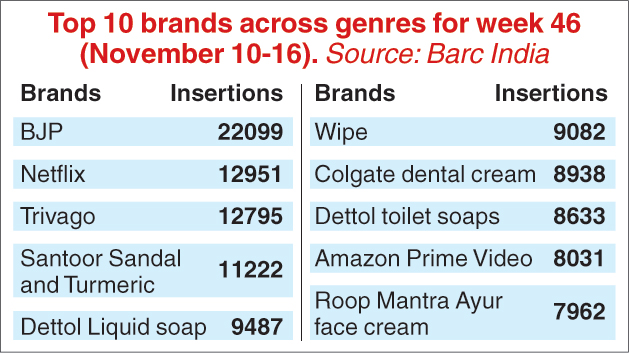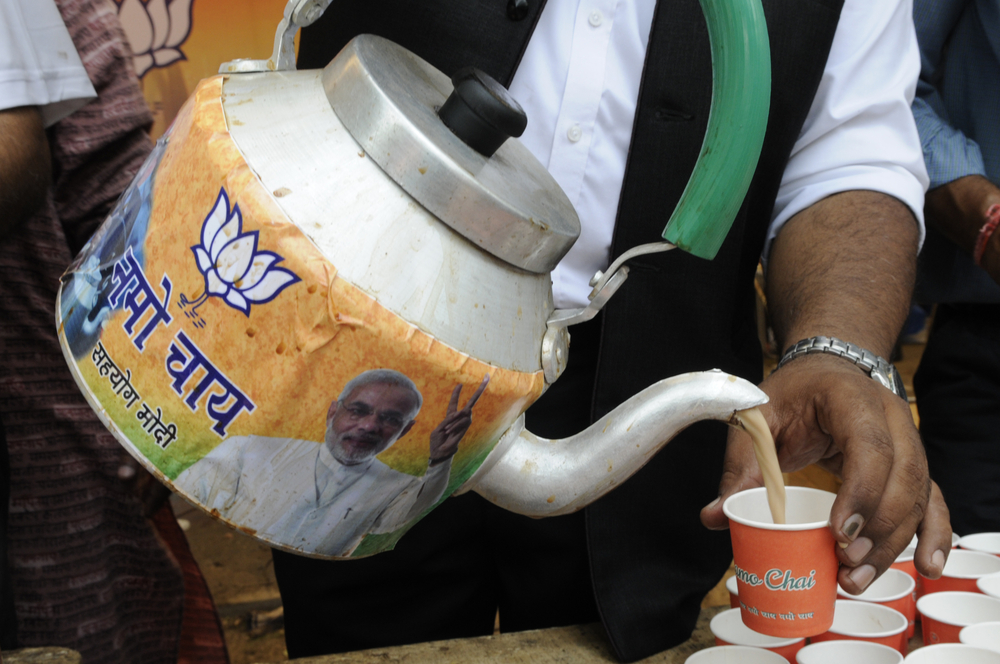The BJP has finally fulfilled Narendra Modi’s dream of a “Congress-mukt” Bharat — on a list of Top 10 brands.
The BJP has beaten a face cream, a toilet soap, a wipe, a toothpaste and Netflix to emerge as the “brand” that has been advertised the most on Indian television in the preceding week. The Congress is nowhere in the picture.
Makers of toiletries and other fast-moving consumer goods will give their right arm and more for a perch at the top of the heap. But the pinnacle need not be the best advertisement for a party that casts itself as a messiah of the poor, especially in the middle of key Assembly elections and while battling charges of flirting with crony capitalists.
The ad spend on these very elections is almost certainly the catalyst that has pitch-forked the BJP to the helm of the Top 10 brands drawn up by the Broadcast Audience Research Council (Barc) in India for the week ending November 16.
So much so that the BJP is estimated to have clocked 22,099 insertions (the number of times a brand’s advertisements are aired), which is over 9,000 more than the runner-up brand, Netflix. The world’s leading online subscription service for TV shows and movies has made only 12,951 insertions between November 10 and 16 on Indian television.
The BJP is lonely at the top not merely because of the yawning gap. It is the only political party to find a place among the top 10 brands, which include soaps, a face cream, a wipe and a hotel booking service.
The top advertiser is not the BJP but Hindustan Lever, a company that has multiple brands. The BJP is the top “brand”, which means that among the brands advertised by different entities or companies on TV, the party has been advertised the most in the particular week.
Asked, a BJP leader declined to comment on record but another said on condition of anonymity: “You need a national party for comparison. Comparing with the Congress, a two-state party, is unjustified.”
The Congress seemed to be celebrating its inability to make the list. Citing the Barc data, the Opposition party on Friday demanded that the Election Commission look into the BJP’s advertisement spend.

Telegraph infographic
The BJP’s top slot, according to Congress spokesperson Manish Tewari, is not an aberration as in the previous week the party was Number Two on the list. “For quite a while, the BJP has been a large spender in the media space. What this reflects is a clear nexus between big business and big politics. This is crony capitalism personified. This is the quintessential ‘suit-boot ki sarkar’ as articulated by Congress president Rahul Gandhi,” Tewari said.
“What has allowed this kind of ad spend is the totally opaque electoral bonds. The opacity has led to a process where there is unregulated transfer of funds from big business to big politics.”Tewari said that rampant abuse of electoral bonds was possible because their management was skewed in favour of the ruling dispensation. Only the government of the day has access to the source of the funds used in buying the bonds and also their final destination, he added.
“This is a disincentive to corporates from funding other parties, especially under the current regime where every investigating agency has been unleashed on the BJP’s political opponents and also non-pliant businesses,” he said, pointing out that even the Election Commission had expressed unhappiness about the electoral bonds.
The electoral bonds were introduced in the Union budget of 2017-18, and came into operation in January this year. The government had billed the introduction of the electoral bonds as a “game-changing’’ decision to clean up political funding without disclosing the identity of the donors as many had expressed reluctance to donate to political parties through bank instruments because they took away anonymity.
For the purpose of issuing electoral bonds, the RBI Act was amended. The donors are allowed to purchase the bonds from authorised banks, against only cheques and digital payments. They are redeemable only against the designated account of a registered political party.
Periodic analyses, by the Association of Democratic Rights (ADR), of records submitted to the Election Commission over the past couple of years have shown the BJP as the biggest recipient of corporate funding.











